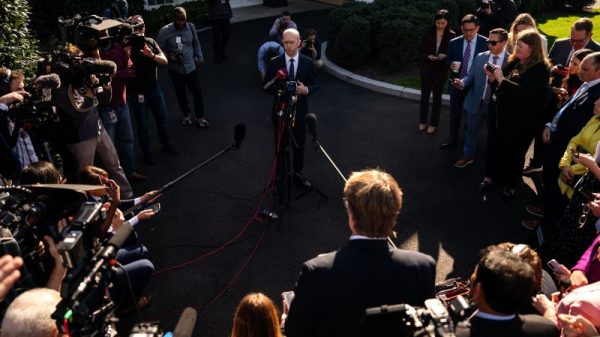House Majority Leader Steve Scalise (R-La.) will be away from Washington until February so he can receive a stem cell transplant as part of his treatment for blood cancer, further dwindling the House Republicans’ narrow majority.
Scalise’s temporary absence comes as the House is facing down significant deadlines. There’s a partial government shutdown looming over Washington, with House Republicans threatening to oppose federal funding for crucial government services and aid to Ukraine unless Congress enacts strict changes to border security laws. Funding for roughly 20 percent of the federal government expires Jan. 19, and money for the rest of the government runs out Feb. 2.
Another Republican, Rep. Bill Johnson (Ohio) is retiring later this month to lead Youngstown State University — narrowing the House GOP’s bench further. That means Speaker Mike Johnson (R-La.) can only afford to lose two members of his party to pass any legislation, or rely on Democratic support for measures.
Passing consequential bills with the support of Democrats, especially involving government funding, has greatly irked hard-line Republicans, who ousted former Rep. Kevin McCarthy (R-Calif.) from the speakership and put Johnson on notice.
McCarthy retired at the end of December after being removed from his leadership role in an effort instigated by far-right members of his conference. Former Rep. George Santos (R-N.Y.) was expelled from Congress last month, too.
Scalise was nominated by a majority of the GOP conference to replace McCarthy as speaker last fall, but he ultimately could not clinch the necessary 218 votes from Republicans on the House floor for reasons, including worries that his health could hurt his ability to travel to fundraise for candidates during a busy election season. Scalise has since served as a leadership mentor for Johnson, a fellow Louisianian, who ascended quickly from the rank-and-file to the speakership.
Scalise’s office said in a statement on Friday that in December, he “successfully completed induction chemotherapy and had a positive response.”
“It has now been determined he is eligible for an autologous stem cell transplant. He is currently undergoing the transplant process, marking a significant milestone in his battle against cancer. Once the procedure is completed, he will be recovering under the supervision of his medical team and will work remotely until returning to Washington next month,” the statement continued.
Scalise announced in August that he was diagnosed with multiple myeloma, a treatable, rare form of blood cancer.
As majority leader, Scalise is the No. 2 Republican in the chamber. A former Louisiana state lawmaker, Scalise has served in Congress since 2008 and is running for reelection for his ninth full term.
Multiple myeloma occurs in plasma cells — the white blood cells that help fight infections by making antibodies that attack germs — according to Mayo Clinic. In someone with multiple myeloma, these cancerous cells grow out of control, accumulating in the bone marrow and crowding out healthy blood cells.
Scalise’s procedure involves using stem cells from one’s own body, which are transplanted back into a patient’s bone marrow after chemotherapy, according to the M.D. Anderson Cancer Center. Infection risk is high after the procedure. Patients also face risks of bleeding and anemia. Normal blood counts, according to the center, are expected to return within two to four weeks and patients typically return to normal activities within three to six months.
Scalise has overcome serious medical challenges before, particularly in 2017 after he was shot and critically wounded when a gunman opened fire at a GOP practice for the Congressional Baseball Game. Scalise was shot in the left hip, requiring several surgeries to deal with fractured bones, injured internal organs and severe bleeding.
Amy B Wang and Laurie McGinley contributed to this report.




























